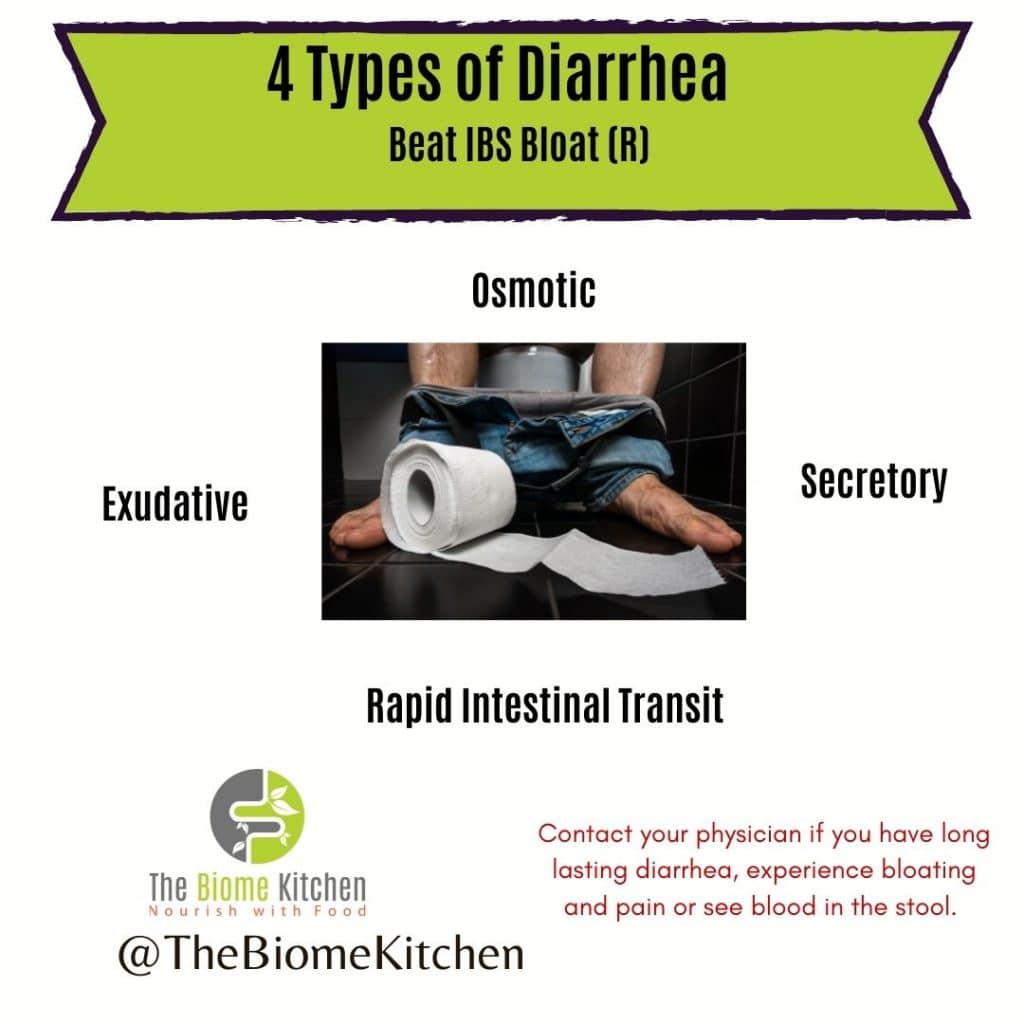
Suddenly you are rushing to the toilet with no time to spare- and if you make it, you just have to sit and let go… sound familiar? Everyone has experienced diarrhea in their lives whether it is from a food infection or intolerance , or tummy bug or for other medical reasons. The fact is, diarrhea can not only be embarrassing or distressing it can also make you feel tired and run down.
What is diarrhea?
Loose stool and frequent passage of watery stool leads to excessive loss of fluid and electrolyte. this If you are experiencing diarrhea more than three times a day or more than a liter of stool is being excreted from an ileostomy or colostomy- that is also defined as diarrhea.
The 4 Types of Diarrhea
“Diarrhea is classified into four categories: osmotic, secretory, exudative, or rapid intestinal transit diarrhea.

- Osmotic diarrhea is caused by the presence of solutes in the gastrointestinal tract that are poorly absorbed and produce an osmotic effect. The osmotic effect is the movement of water from low solute concentration to high solute concentration. The causes of osmotic diarrhea may be lactose intolerance, fat malabsorption, dumping syndrome after gastric surgery, or certain medications (i.e. hypertonic or sorbitol-containing liquid medications).
- Secretory diarrhea occurs when there is an over secretion of water and salts in the intestine, which is caused by bacterial toxins (Clostridium difficile, E. coli, etc.), caffeine, viruses, or increased bile acids following an ileal resection.
- Exudative diarrhea is associated with damage to the intestinal mucosa, leading to the release or oozing of mucus, blood, and plasma proteins from cells as result of inflammation or injury. This increases the fluid content of feces and is present in ulcerative colitis, Crohn’s disease, or radiation enteritis.
- Finally, rapid intestinal transit diarrhea is defined as an increase in propulsive activity in the colon. When the colon contracts more intensely than normal, food is passed more quickly through the digestive system and less water is absorbed back into the body, making the stool too watery. Causes of this type of diarrhea are irritable bowel syndrome, surgical bypass, gastric and intestinal resections, antibiotics, or stress.” (1).
During episodes of diarrhea it is hard to figure out what to eat. What foods will sooth your gut as well as add back important nutrients.
Hydration
By losing so much water at once, hydration becomes an important issue. Electrolytes such as sodium and potassium are crucial to get fluids back into the cells. It’s important to gain back fluid balance with water and for some even a sports drink can be helpful. I like to recommend regular sugar-based (glucose) sports drinks- not the zero calorie ones. For two reasons:
- The body needs glucose after losing all that nutrition down the toilet.
- Many people are sensitive to the zero calorie sweeteners ( sugar alcohols) which can make diarrhea worse.
Liquid or Blenderized Meals
Liquids over solids may feel better on your stomach as well as be quickly absorbed by your gut. Liquid meals can be in the form of :
- Soups- simple
- Stews- bland- not spicy
- Shakes
- Blenderized Meals
Making these liquids should be with the most whole and clean ingredients- no artificial colors, flavors, chemicals, preservatives and artificial sugars. Think- chicken soup or bone broth or a super smoothie green shake or berry shake. Blenderized meals mean making the food in a blender- like whipped mashed poatatoes or apple sauce.
THE B.R.A.T. Diet
After a diarrhea episode your stomach will feel unsettled. The last thing you may want to do is eat. There is the tried and true B.R.A.T. Diet which consists of soothing foods that help to form stool. These are Bananas, Rice, Applesauce and Toast. For those with food sensitivities- toast can be a gluten free option.
The Canadian Society of Intestinal Research recommends these foods to have and foods to avoid during diarrhea episodes.
The following foods may be better tolerated:
| Fruits and Vegetables | Applesauce, apples, bananas, peaches, apricots, canned pears, grapefruit, potatoes, melons, squash |
| Breads and Cereals | Oatmeal, oat bran, white rice, plain noodles*, white bread/bagels*, crackers*, cream of wheat*, arrowroot cookies* |
| Protein foods | Cheese** (especially low fat), yoghurt**, eggs, lean fish, beef, pork, skinless poultry |
| KEY | * Contains gluten** Contains dairy |
Foods to limit:
| Fruits and Vegetables | Prunes, prune juice, berries, dates, any dried fruit, figs, rhubarb, green beans, wax beans, peas, Brussels sprouts, corn, broccoli |
| Breads and Cereals | Whole wheat, bran products, Shreddies, Mini Wheat, Raisin Wheat, Shredded Wheat, Bran Flakes, bulgur, Wheetabix, All Bran, Bran Buds, barley, Red River, wheat germ, Muslix |
| Protein foods | Dried beans, dried peas, lentils, nuts and seeds, and fried meats, fish, and poultry |
Consult with your Physician
Diet may help manage the symptoms of diarrhea but always talk to your physician if diarrhea
does not stop, is associated with bloating or pain or you see blood in the stool. Your physician will be able to assist with medications and further medical help. If diarrhea persists – nutrition needs to be evaluated to prevent malnutrition.
REFERENCES
1. https://badgut.org/information-centre/health-nutrition/diarrhea-and-diet/
